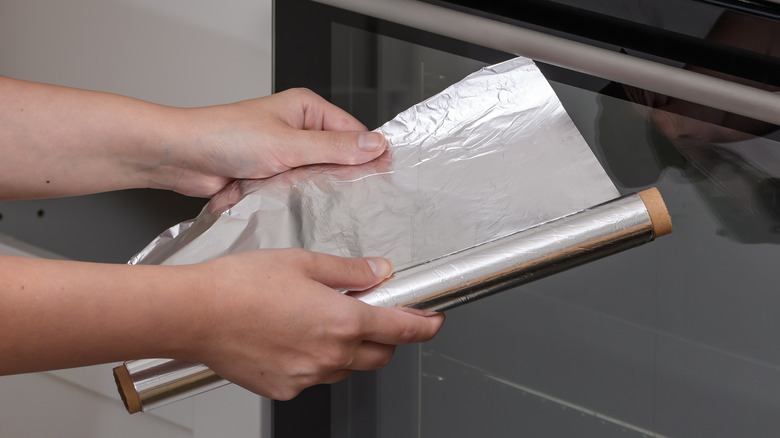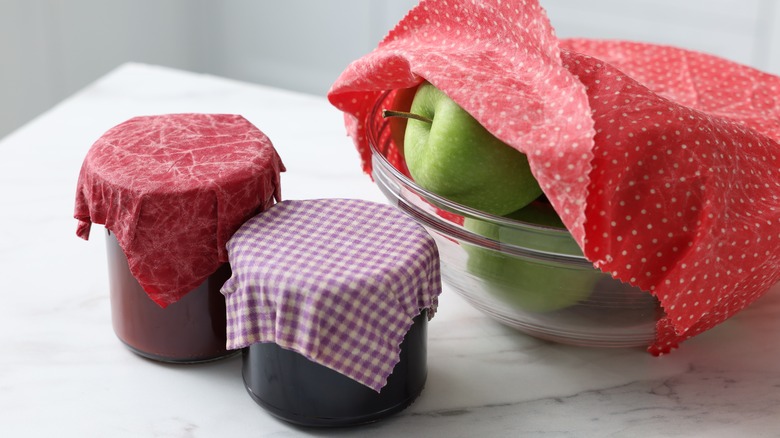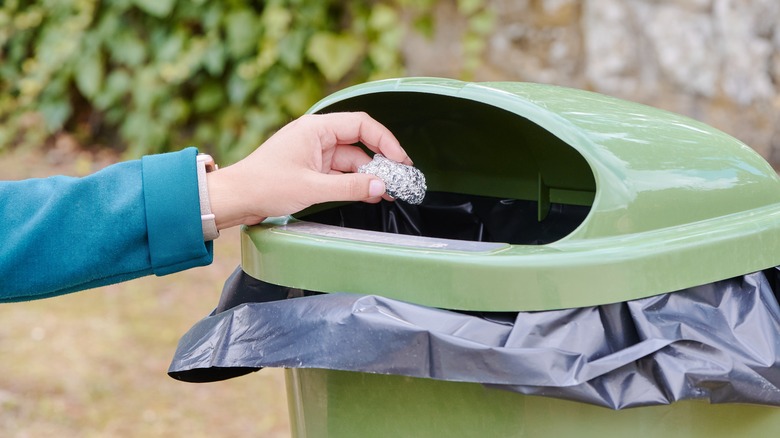Eco-Friendly Alternatives To Using Aluminum Foil In Your Home
Strong, versatile aluminum foil is so convenient that you're likely to see it in the homes of stalwart tree huggers. We've heard murmurings about the downsides of using this material for years, but choosing it often seems preferable to more-notorious plastic. But single-use products, even ones touted as eco-friendly, are still wasteful. Now it's time to confront foil and decide why and how we can do without its convenient sheets. There's a wide array of reusable or low-impact products for kitchen storage and use around the home as alternatives. For food storage, try reusable glass or stainless steel containers, or cover dishes with silicone lids or beeswax wraps. For household fixes, there are non-toxic alternatives to using foil for cleaning and repairs.
Aluminum foil can be great for household hacks, like catching spills, sharpening scissors, and cleaning metal pots, cutlery, and even jewelry. Yet, the more ways we use it, the more damage we do to the planet. Also, too much exposure to this metal can result in enough adverse health effects to raise anyone's eyebrows. There are many mistakes you can make while using aluminum foil, so why not just leave it off your future grocery lists?
What can you use instead of aluminum foil?
Food storage is so easy with aluminum foil. Cover food containers to put away leftovers, line or cover baking dishes, or craft it into an envelope to hold essentially anything. But we can often forego this unnecessary product in favor of reusable ones that give us more bang for our buck and keep us healthy.
Instead of using foil, store and save food in glass or stainless steel containers or with reusable covers. Wrap food and cover plates with beeswax-infused fabric wraps. You can get a reliable seal around sandwiches or dishes by warming the wax in the fabric with your hands as you crimp the fabric around what you want to preserve. Silicone lids and baking sheets are durable and non-toxic ways to cover food for storage or while baking.
While aluminum foil is handy for other household projects, there are plenty of easy alternatives. Instead of using aluminum foil and baking soda to whisk away tarnish, look no further than the toothpaste in your medicine cabinet. You can use this common bathroom product to polish your silver. Need to sharpen your scissors? Skip cutting some foil to fix up the blades. Your scissors are perhaps the most important place to use sandpaper that you're probably missing. Just make a few cuts in a sheet, and your scissors will be ready to tackle more projects.
Why shouldn't you use aluminum foil?
From mining to disposal, using aluminum foil wreaks havoc on the environment. The raw materials used to make foil often come from rainforest regions, and extracting them requires massive clear-cutting. Manufacturing the foil is a dirty process, as well. Just extracting the raw metal produces up to four times as much toxic waste as it does aluminum, and the energy required to produce just one ton of it adds up to the equivalent of several years' worth of electricity used by a two-person household, according to Rainforest Rescue.
Aluminum foil is also difficult to recycle. It's hard to know if you can recycle your aluminum foil after using it in the house. Curbside collection programs typically require some picky preparation; the foil must be clean and crumpled into a ball 2 inches in diameter or larger to make the recycling process easier. If it's not recycled, aluminum foil can take up to 400 years to break down in a landfill.
Using aluminum foil harms your body as well as your budget. Exposure to too much aluminum has been linked to health risks like male infertility and Alzheimer's disease, and at around $5 for a 75 square foot roll, using aluminum foil only once is pretty costly.


